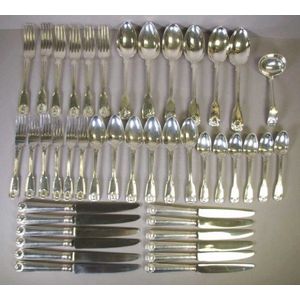Antique Silver Cutlery Set with Deer Crest
You must be a subscriber, and be logged in to view price and dealer details.
Subscribe Now to view actual auction price for this item
When you subscribe, you have the option of setting the currency in which to display prices to $Au, $US, $NZ or Stg.
- Hallmarks - A mark stamped on articles of precious metals in Britain, since the 14th century, certifying their purity. It derives its name from the Guild Hall of the Goldsmiths' Company, who recieved its Charter in 1327 giving it the power to assay (test the purity) and mark articles of gold and silver.
The hallmark will consist of several marks, including the:
- silver standard mark, indicating the purity of the metal. Sterling silver is .925 pure silver.
- the city mark indicating the city in which it was assayed eg London, Birmingham, York etc.
- the date mark, usually a letter of the alphabet in a particular font and case,
- a duty mark, indicating whether duty had been paid to the crown, and only in use from 1784 to 1890
The piece may include an additional mark, the maker's mark, although not forming part of the hallmark, will be located in the vicinity of the hallmarks.
Sometimes silver plated items will bear faux hallmarks, often confusing those not familiar with silver markings. - Sterling Silver - Sterling silver is a mixture of 92.5% pure silver and 7.5% of another metal, usually copper. Fine silver is 99.9% pure silver, and is relatively soft and the addition of the very small amount of copper gives the metal enough strength and hardness to be worked into jewellery, decorative and household objects.
- Victorian Period - The Victorian period of furniture and decorative arts design covers the reign of Queen Victoria from 1837 to 1901. There was not one dominant style of furniture in the Victorian period. Designers used and modified many historical styles such as Gothic, Tudor, Elizabethan, English Rococo, Neoclassical and others, although use of some styles, such as English Rococo and Gothic tended to dominate the furniture manufacture of the period.
The Victorian period was preceded by the Regency and William IV periods, and followed by the Edwardian period, named for Edward VII (1841 ? 1910) who was King of the United Kingdom and the British Dominions and Emperor of India for the brief period from 1901 until his death in 1910.
This item has been included into following indexes:
Visually similar items

Georgian sterling silver single struck fiddle and shell pattern mixed cutlery service, mainly by Williams Eley & Fearn, London 1822, 3670g

Part silver plate cutlery service, comprising five serving spoons, twelve main forks, nine entree forks and fork teaspoons,

A collection of Victorian fiddle thread and husk sterling silver cutlery mixed marks 3905g to include Mary Chawner & George Adams Elizabeth Eaton etc., (8x knives) 3x lg table spoons, 8x tea spoons, 12x lunch forks, 14x dinner forks, 12x dessert spoons, 4x

Sterling silver cutlery set, fiddle thread and shell pattern, comprising of a sauce ladle and 6 each main forks, entree forks, table spoons, dessert spoons, teaspoons, silver handled main knives and entree knives, various predominantly Victorian hallmarks
